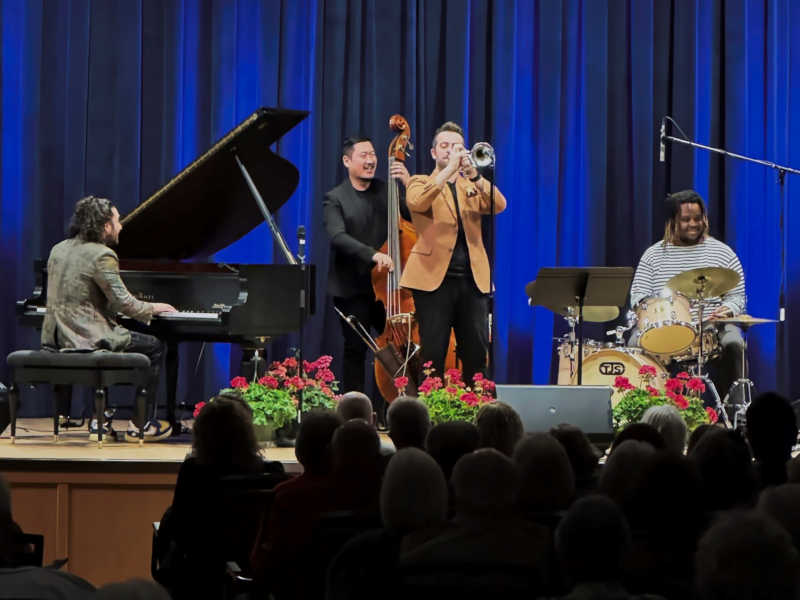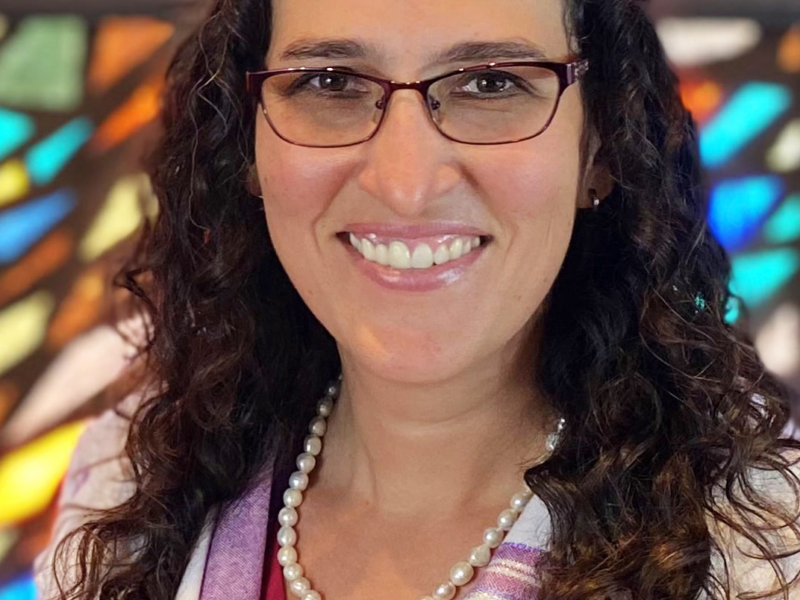By Ellen Braunstein
Joseph Specter sang in a garage rock band as a teen, but he got as much of a rush “listening to and experiencing opera,” he says. The president and general director of Arizona Opera worked from 1999 to 2007 as a professional baritone, performing in more than 20 opera and musical theater roles with companies across the country.
One of his earliest gigs was his bar mitzvah and his love of opera was nascent then. “By age 15 or 16, I knew so few people that connected to opera. I thought how special it is to know about this treasure that’s generally shielded away from society. To be part of sharing that with people and shining a light on that, that energy and seed were planted in me and still lives today.”

“The project of ‘Carmen,’ the graphic novel, fits squarely within what Arizona Opera is – an organization that is really committed to figuring out how opera can serve at all times, whatever the circumstances of the day might be.
~Joseph Specter

Spector earned an artist diploma from Philadelphia’s Academy of Vocal Arts. He is an honors graduate of the double-degree program between Tufts University and the New England Conservatory of Music – in political science and voice, respectively.
He served as general director of Austin Opera from April 2012 until May 2016, leading that organization through a significant budget growth, revitalizing subscriptions and contributions all while presenting vibrant and artistically successful operatic productions.
Prior to joining Austin Opera, Specter served as director of institutional relations at the Metropolitan Opera, where he worked on corporate sponsorships and public and foundation grants.
Arizona Opera entered its fiftieth season in fall of 2021, producing fully staged operas, concerts, and collaborative programs throughout the state of Arizona. It just wrapped up spring productions for 2022 in Phoenix and Tucson with “Così fan tutte” by Mozart.
Illustrations for graphic novel, Carmen and tenor, director and writer Alek Shrader.
The live stage performances also featured “A Little Night Music” by Stephen Sondheim and “Carmen,” composed by Georges Bizet.
Since its inaugural year in 1971, Arizona Opera has produced more than 200 fully-staged operas and concerts. The 2022-2023 season features the new opera, “The Fall and Rising,” “Ariadne auf Naxos,” a Strauss masterpiece, “Tosca,” Puccini’s greatest opera, “The Sound of Music,” a timeless classic, “The Magic Flute,” Mozart’s enduring fairytale, and “Frankenstein,” Arizona Opera’s third world premiere.
Since June 2016, Specter, 47, has been responsible for the opera company’s activities on a day-to-day basis. On a budget of $7 million, he collaborates closely with the staff and board of directors to form the strategy for how the opera company “can serve the community through the art form and through the resources of the organization.”
Arizona Opera, like most cultural organizations, had to pivot creatively during the pandemic, Specter said. “The avenues that are usually open to us, that are the most often tried and true, have not always been available.”
One example of that pivot is the company’s support of a graphic novel based on Bizet’s “Carmen” which was funded by a Kickstarter campaign. Arizona Opera is presenting the story of “Carmen,” adapted as a 90-page hardcover graphic novel by tenor, director and writer Alek Shrader and illustrated by P. Craig Russell,the artist Aneke and Hassan Otsmane-Elhaou. “Carmen,” which premiered about 150 years ago, is the story of an intelligent, daring young woman who wants to live her life in her own way, but her autonomy is challenged.
The idea for a graphic novel emerged from a business competition that Arizona Opera launched in 2019. Shrader was selected as winner for “a brilliant idea for a graphic novel based on opera stories. That choice was made after the pandemic was already underway,” Specter said.
“This competition was started under the notion that opera companies in the United States should be seeking ways to be more sustainable, to help guarantee our ability to better fulfill our missions beyond just conventional ticket sales and contributions, which of course, are the bread and butter of most performing arts organizations.
“That was really exciting about Alek’s idea – to create a product for which there is a sizeable market, but one that is also connected to the art form of opera,” Specter said.
“The project of ‘Carmen,’ the graphic novel, fits squarely within what Arizona Opera is – an organization that is really committed to figuring out how opera can serve at all times, whatever the circumstances of the day might be.”
Arizona Opera has worked to scale up its service, both during and after the pandemic, with podcasts, videos and film offerings. What was supposed to be a theater production became the company’s first feature-length film. “Copper Queen” was made by Arizona Opera’s first-ever all-female director, conductor and designer team. “Copper Queen” is based on the eponymous haunted hotel in Bisbee, Arizona. It is an official selection of the Phoenix Film Festival that screened in April.
Arizona Opera streamed concerts, arias and recitals during the pandemic. “We’ve really got our oars in the water of the reinvention during the pandemic period not just because we wanted to be viable as a business, but because we were so committed to serving our communities. During the pandemic, there has been nothing the community needs more than connection. And art is such a special way to build that.”
There is more programing that connects opera to communities in the west, particularly communities of color. The “Living Opera Understanding Diversity”
(LOUD) video series features discussions and performances focusing on Black, Indigenous and people of color. Spector also hosts the “UnMic’d” podcast focused on music and features sometimes surprising connections to the world of opera.
He said that it’s almost a certainty that “elements of what we did during the ‘quarantine period’ will carry over or be adapted in some way. Arts organizations that will be successful coming out of the pandemic can’t afford to have been unchanged by that moment.”
Arizona Opera is balancing innovation with a healthy respect for tradition. “When we put traditional operas on the stage, we’re very focused on making sure that we get the very best performers and creative teams possible to




Arizona Opera ‘s facility, dazziling posters from Arizona Opera’s past productions and Joseph Specter in two past performances at the Academy of Vocal Arts: Joseph Specter as Alberich in Wagner’s Das Rheingold and as Belcore in Donizetti’s The Elixir of Love.






really make those moments sparkle,” Specter said. “It’s that in-theater experience and the most beautiful voice possible that are the main attractions. As a former professional opera singer myself, I can tell you that we do focus intensely on trying to bring the best talent we possibly can to the stage and to bring beautiful productions that will allow those voices and performances to really shine. Then of course we’ve added innovation to our in-theater performances as well by bringing productions of newer operas and even musical theater pieces to help expand the audience with productions in which they are excited, involved and feel welcome.”
“ It’s a big challenge to let every person on the street know that opera is for them,” he said. “We’re not a Fortune 500 company with a huge marketing budget. We seldom can let every single person know about our product or service and we have to be strategic about that. We’re still in a learning curve in that process, exploring new ways, particularly through digital strategies, to reach people.”
Arizona Opera has been connecting to diverse community organizations through its productions and outreach. In the truncated 2019-2020 season, the opera company featured “Fellow Travelers” about the McCarthy-era scare and hostility directed toward homosexuals in government. Arizona Opera connected with a segment of the community with “Shining Brow,” an opera about the tormented early life of Frank Lloyd Wright. The production included the fire at the original Taliesin West, the architect’s winter home and studio in Scottsdale. The opera company also appointed Courtney Clark as director of community alliances in 2021. “We launched a diversity, equity and inclusion initiative in late 2020 which resulted in the creation of that new position here,” Specter said. Arizona Opera brings music education into the schools. In a typical year there are 180 performances, many in schools with children from low-income families. The “Brewster OperaTunity program, led by Cassie Robel, director of education, offers a 40-minute adaption of a classic or an original story designed for K-8 audiences. During the pandemic, Arizona Opera was doing online performances for school children, masterclasses included. They offered a partnership program with Ballet Arizona and supplied materials for a digital teacher-led program.
The company’s balance sheet puts it in a solid position to emerge fully from the pandemic, Spector said. The board of directors and other generous donors have stepped up to help during the pandemic.
“Ticket sales, the grass roots elements of our fundraising program, has certainly been compromised by our inability to be in the theater for a large portion of the last two years. So, we have a lot of work to do in rebuilding audience, helping people to feel comfortable and excited about coming back.”
Throughout the dark days, Specter drew on his training as an opera singer and his 12-year-long practice of meditation.
“I have a passion for the art form that runs very deep within me,” he said. “The ability to tap into that passion as a way to fill your sails and continue moving forward, that has been really essential. I would say that knowledge and being able to convey what matters and what is special about opera, that’s always handy.”
Of his meditation practice, he said, “I was able to be mindful during a time when mindfulness was in scarce supply. I was able to be present emotionally and intellectually for this organization and to draw from that stillness. That kind of well of strength isn’t always obvious to us in our modern society.”
And what is his favorite opera? Specter’s answer comes by way of a friend, who told him the best opera is the one that’s playing. “When you love the medium of the human voice,” Spector said, “elevating the power of storytelling, that’s what you fall in love with.” i






